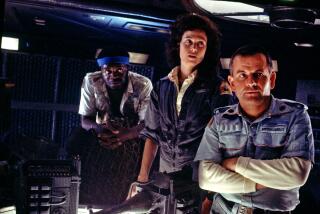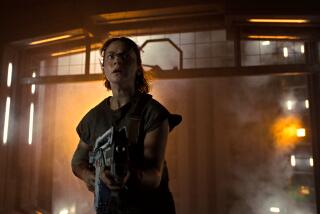SIGOURNEY WEAVER: ‘JUST CALL ME RAMBOLINA’
Move over Clint; get lost Sly; make room for the newest, baddest toughie on the block--actress Sigourney Weaver.
Clint and Sly may have come across some pretty heavy slimeballs in their time, but the disease that this babe cures comes in the form of gigantic, man-eating, alien monster-things.
And boys, she made these aliens’ day with not one but three futuristic Russian AK-47-type jobs that fire millions of rounds a second and even launch grenades.
“Just call me Rambolina,” Sigourney Weaver deadpanned, attempting a momentary macho glare that broke quickly into a grin. Dressed in a yellow sun dress, the elegant actress looked anything but tough as she humorously acknowledged what may become one of her most memorable performances in “Aliens.” Weaver was in town from her New York home to promote the film, ehich opens Friday.
In the sequel to “Alien” (director Ridley Scott’s 1979 science-fiction classic about a murderous extraterrestrial that runs amok on a spaceship), Weaver takes on a planetful of the hungry, nightmarish beings with a spectacular arsenal of high-tech weaponry.
“Aliens” was directed and written by James Cameron, who directed and co-wrote “The Terminator” (with Gail Ann Hurd) and also co-wrote “Rambo” (with Stallone). Under Cameron’s direction, Weaver emerges as a one-woman army (a la Stallone, Schwarzenegger, Chuck Norris et al.)--who, unlike the aforementioned, also delivers far more than one-word dialogue.
Favorable early reviews (Daily Variety called Weaver’s performance “smashing,” describing it as “one of the great female screen roles of recent years”) and enthusiastic industry screenings have distributor 20th Century Fox anticipating another hit on its hands (the original grossed more than $100 million in worldwide box office in 1979).
The sequel took an unusual six years to make it to the screen and, at first, it seemed that it would make it without Weaver. “Alien” had been her big-screen debut and the actress--who was told during her stint at Yale Drama School that she didn’t have the talent to pursue an acting career--had more or less abandoned further dramatic encounters with monsters (her role in “Ghostbusters” notwithstanding).
“My answer when I was first approached about the sequel was no,” Weaver recalled. “I thought, why do something that has already been done? I wasn’t very keen on it at all, especially since David Giler, Walter Hill (the producers, with Gordon Carroll, on the first “Alien”; the three are executive producers on the sequel) and I had joked about it for so long. David once said to me, ‘Well, if we ever do the sequel and you cooperate, you can be in the picture. If you don’t, they will open your hypersleep capsule lid (where crew members in the “Alien” spaceship slept away light years) and you will dissolve into dust!’
“It was always a joke and I think it took someone as confident as Jim (director Cameron), with as different a vision from Ridley’s, to attempt it.”
Cameron (who at the time had not yet directed “Terminator”), however, was adamant that the actress be involved in the sequel.
“He told me that the story was primarily about what happened to my character and said he wouldn’t do the film without my participation. I think that showed a loyalty that is quite unusual in this business.”
Weaver knew that her character would never want to see another alien again “but Jim had given me a set of circumstances in the beginning that explained it. Ripley is 57 years out of her own time (having hibernated until a deep space salvage crew found her drifting space ship); her family is dead; she loses her job and her license to work, and is a broken person because of this.
“The story was about someone who has to regroup, who goes back (to fight the aliens) because if she stays inside her room, she knows she will slowly unravel. So I go back for cowardly reasons.”
As she spoke, it became easy to see why Weaver is sought after by film makers and Broadway producers with an “intelligent woman” role to cast. Not only is she intelligent (she majored in English at Stanford before attending Yale) and unpretentious, she possesses a quick wit and a well-developed sense of humor. Those qualities have come to the screen in “The Year of Living Dangerously” and “Eyewitness” and on Broadway in “Hurlyburly” (for which she received a Tony nomination). For the past year, Weaver lived in Europe, where she filmed “Aliens” and the coming “Half Moon Street” and the French film “One Woman or Two.”
Her marriage to avant-garde theatrical director Jim Simpson (who directed such shows as “Chopin in Space”) reflects both that humor and a desire not to be entirely immersed in Hollywood mainstream commercialism. She never intended to be an actress, but did recall her first stage role, at 6, when she played the Cheshire Cat in the school production of “Alice in Wonderland.”
“I don’t remember where it came from, but I played the cat in this flamboyant, raging queen manner,” said the daughter of English actress Elizabeth Inglis and Sylvester (Pat) Weaver, the NBC pioneer responsible for creating “Today,” among other shows.
In those early years, there were no aliens to give her nightmares (“Gosh, I hope little kids don’t get them from this picture”), but Weaver described her own version of things that went bump in the night.
“I remember exactly what they were because I only recently have shed those fixations,” she said, chuckling.
“My mother read us ‘Ben-Hur’ and ‘Robinson Crusoe,’ which were pretty sophisticated stories for young children.
“As a result, I grew up terrified of cannibals and lepers. I would have these nightmares where the cannibals would run through Central Park, up to our apartment and would bang on the bathroom door, where I had taken refuge.”
Even as an adult, Weaver, 36, classifies herself as an impressionable chicken when it comes to watching science-fiction movies.
“The other night I watched ‘C.H.U.D.’ on TV (a B-horror movie about humans-turned-radioactive slime-monsters living amid toxic waste in a city’s sewer system) and woke up in a cold sweat after having nightmares about those things,” she said. Laughing, she added, “And those things were more silly than scary.”
Even the scariest things on screen don’t look like much during production, which often makes it difficult for an actor playing opposite a special effect. “Aliens” was no exception.
“It’s hard doing scenes with special effects,” Weaver said. “Often, in order to make the scene easier for Carrie Henn (Weaver’s 9-year-old co-star), they would make sounds and things to scare her. I would say, ‘I want the same thing.’ I can do it out of my imagination, but it gets hard when two stunt men are hanging out of the alien and the camera crew is cracking jokes. You have to pull yourself away and try to continue to react properly. I don’t think special-effects work unless the actor can sell those effects to the audience.”
Weaver remembered doing such a bang-up job of reacting to the aliens at one point that co-star Henn felt it necessary to have a talk with her.
“She said to me, ‘Why are you so scared, it’s just a rubber thing?’ ” Weaver chuckled, “I felt so embarrassed.”
Even more embarrassing for the actress--a gun control supporter--was finding herself expending more firepower than two Rambos and a Dirty Harry combined.
“I read the script for the human values and kind of skipped over all the gun stuff; I didn’t pay any attention to the fact that guns were a big part of this movie’s atmosphere,” she said, chagrined.
In fact, director Cameron had worked hard to create the “Smart-gun” that Weaver and others used so frequently. Taking a Thompson submachine gun and coupling it with a Franchi SPAS 12-gauge pump-action shotgun mechanism, Cameron dressed the sizable final product in a futuristic wrapper and proceeded to give the cast lessons on its use.
“We had almost daily gun and grenade practice,” explained Weaver, who had never used a gun before. “I found those scenes quite difficult. I would stand there thinking, ‘Here I am a member of the gun control lobby in a picture where I do nothing but shoot guns.’ ”
But the experience left her even more convinced of the need to limit weapons. “At the end of shooting all day and wasting entire sets, you get very intoxicated with your own power, you feel quite heady with all of it.”
Weaver did not follow in the word-eating steps of other sequel-doers and swear that she would never do another “Alien” picture, but she felt it unlikely.
However, the “intelligent woman” naturally found a delicious irony in the possibility that she may be deluged with scripts that used to go only to Sybil Danning.
Smiling, she speculated, “Well, you know, I always did want to play Sheena--maybe they’ll do a sequel.”
FO
More to Read
Only good movies
Get the Indie Focus newsletter, Mark Olsen's weekly guide to the world of cinema.
You may occasionally receive promotional content from the Los Angeles Times.








